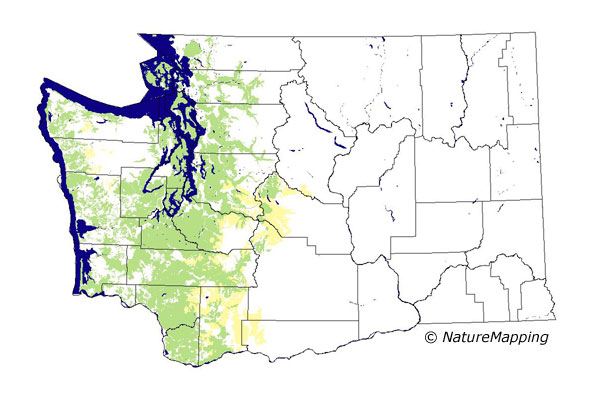 |
Metadata (Data about data or how the map was made)
Legend:
 = Core Habitat
= Core Habitat
 = Marginal Habitat
= Marginal Habitat
Predicted Distribution
Reptiles do not migrate as some birds and mammals, so the colored areas depict
the predicted range for the Northwestern Garter Snake year-round. The habitats
were identified using 1991 satellite imagery, other datasets and experts throughout
the state, as part of the Washington Gap Analysis Project.
Other
maps & Information:
|
Distribution and Habitat Requirements
This species is found in meadows and along the edges of forests, thick brushy areas and talus slopes. It seems to do well in disturbed areas
(e.g., clear cuts, forest openings and edges of the forest where shrubs and nearby) and consumes many slugs. While all three species of garter
snakes occur on various islands within the Puget Sound, T. ordinoides is found on almost all of them.
This species has recently been observed on Ozette Island in Jefferson County.
Models
The Outer and Interior Olympic Peninsula, Puget Trough, Willamette Valley and all Cascades ecoregions were selected.
The Sitka Sprice, Western Hemlock, Puget Sound Douglas-fir and Cowlitz River zones were core. The Silver Fir zone in the Southwest Cascades and
small parts of the Grand Fir and Interior Douglas-fir zones were marginal.
Grasslands, shrublands, shrub and tree savannas and all open-canopy hardwood, hardwood/conifer and conifer forests were good habitats. Low-density
developed residential, cemeteries, golf courses and parks were adequate habitats.
Translated from the Washington Gap Analysis Amphibians and Reptiles Volume by Karen Dvornich
Webpage designed by Dave Lester.